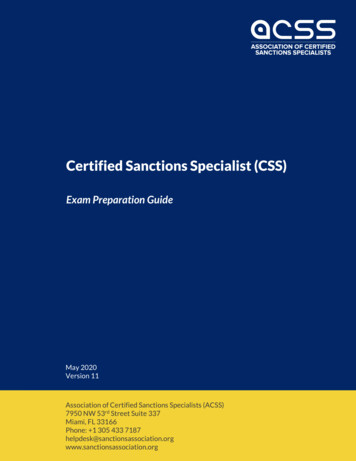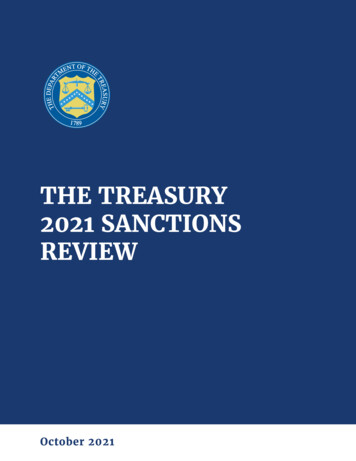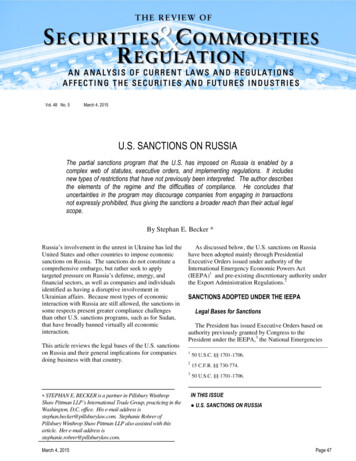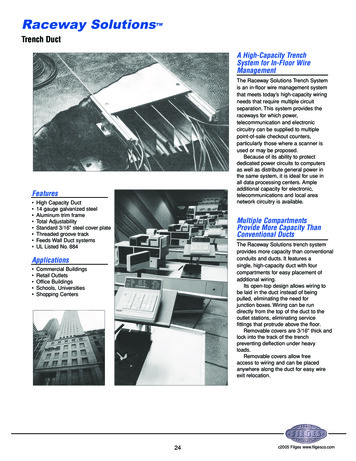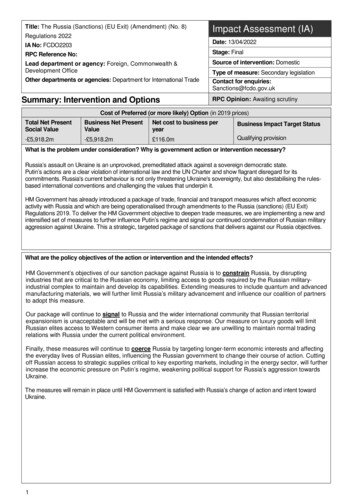
Transcription
Title: The Russia (Sanctions) (EU Exit) (Amendment) (No. 8)Regulations 2022Impact Assessment (IA)Date: 13/04/2022IA No: FCDO2203RPC Reference No:Stage: FinalLead department or agency: Foreign, Commonwealth &Development OfficeSource of intervention: DomesticOther departments or agencies: Department for International TradeSummary: Intervention and OptionsType of measure: Secondary legislationContact for enquiries:Sanctions@fcdo.gov.ukRPC Opinion: Awaiting scrutinyCost of Preferred (or more likely) Option (in 2019 prices)Total Net PresentSocial ValueBusiness Net PresentValueNet cost to business peryearBusiness Impact Target Status- 5,918.2m- 5,918.2m 116.0mQualifying provisionWhat is the problem under consideration? Why is government action or intervention necessary?Russia’s assault on Ukraine is an unprovoked, premeditated attack against a sovereign democratic state.Putin’s actions are a clear violation of international law and the UN Charter and show flagrant disregard for itscommitments. Russia's current behaviour is not only threatening Ukraine's sovereignty, but also destabilising the rulesbased international conventions and challenging the values that underpin it.HM Government has already introduced a package of trade, financial and transport measures which affect economicactivity with Russia and which are being operationalised through amendments to the Russia (sanctions) (EU Exit)Regulations 2019. To deliver the HM Government objective to deepen trade measures, we are implementing a new andintensified set of measures to further influence Putin’s regime and signal our continued condemnation of Russian militaryaggression against Ukraine. This a strategic, targeted package of sanctions that delivers against our Russia objectives.What are the policy objectives of the action or intervention and the intended effects?HM Government’s objectives of our sanction package against Russia is to constrain Russia, by disruptingindustries that are critical to the Russian economy, limiting access to goods required by the Russian militaryindustrial complex to maintain and develop its capabilities. Extending measures to include quantum and advancedmanufacturing materials, we will further limit Russia’s military advancement and influence our coalition of partnersto adopt this measure.Our package will continue to signal to Russia and the wider international community that Russian territorialexpansionism is unacceptable and will be met with a serious response. Our measure on luxury goods will limitRussian elites access to Western consumer items and make clear we are unwilling to maintain normal tradingrelations with Russia under the current political environment.Finally, these measures will continue to coerce Russia by targeting longer-term economic interests and affectingthe everyday lives of Russian elites, influencing the Russian government to change their course of action. Cuttingoff Russian access to strategic supplies critical to key exporting markets, including in the energy sector, will furtherincrease the economic pressure on Putin’s regime, weakening political support for Russia’s aggression towardsUkraine.The measures will remain in place until HM Government is satisfied with Russia’s change of action and intent towardUkraine.1
What policy options have been considered, including any alternatives to regulation? Please justify preferredoption (further details in Evidence Base)Option 0: Do nothing. Rely on existing sanctions to erode the financial power of the Russian Government and toconstrain the Russian state’s ability to destabilise and invade sovereign nations, therefore encouraging them tochange course. Continue to act through diplomatic channels and multilateral fora to signal to the RussianGovernment that such actions are unacceptable and represent serious breaches of international law. However,existing sanctions packages have been insufficient to coerce the Russian government to change course anddissuade decision makers from taking aggressive and destabilising actions against Ukraine. We can also notdetermine how long UK business will continue to self-sanction. Implementing no further sanctions will also goagainst UK objectives to deepen our package, in coordination, as far as possible, with a broad coalition of partners.Option 1: Implement trade sanctions measures [Preferred option]. As part of the UK’s deepening pillar of theRussia sanctions strategy, implement a new and intensified set of trade measures, to influence Putin’s regime andsignal the UK’s continuing condemnation of Russian military aggression against Ukraine. These new trademeasures include prohibiting the export, supply, delivery, making available and transfer of additional categories ofgoods to, or for use in, Russia (as well as for some specific measures (i) and (ii) below, related technicalassistance, financial services, funds and brokering services). The measures are:i.Quantum computing and advanced materials goods and technologyii.Oil refining goods and technologyiii.Luxury consumer goodsThe UK will also prohibit the import, supply, delivery and acquisitioin of certain iron and steel products. This willbuild on the 35% increase on tariffs that came into force on 25 March 2022 and will be similar to the EU import banon iron and steel goods.Will the policy be reviewed? It will be reviewed If applicable, set review date: March 2025Is this measure likely to impact on international trade and investment?YesMicroSmallMedium LargeAre any of these organisations in scope?YesYesYesYesWhat is the CO2 equivalent change in greenhouse gas emissions?Traded:Non-traded:(Million tonnes CO2 equivalent – not this is for imports only, not estimated for exports) 0.23 MtN/AI have read the Impact Assessment and I am satisfied that, given the available evidence, it represents areasonable view of the likely costs, benefits and impact of the leading options.Signed by the Responsible Minister:2Vicky Ford MPParliamentary Under Secretary ofStateForeign, Commonwealth &Development OfficeDate:13 April 2022
Policy Option 1Summary: Analysis & EvidenceDescription: Sanctions against Russia prohibiting the export and import of certain strategic goodsFULL ECONOMIC ASSESSMENTPriceBase Year2019PV BaseYear 2022COSTS ( m)Net Benefit (Present Value (PV)) ( m)TimePeriodYears 9Low:- 5,636.9mTotal Transition(Constant Price) YearsLow0High0Best Estimate0High:- 6,214.7mBest Estimate:- 5,918.2mAverage AnnualTotal Cost(excl. Transition) (ConstantPrice)(Present Value) 640.9m 5,768.2m 783.8m 7,054.3m 688.1m 6,192.7m0Description and scale of key monetised costs by ‘main affected groups’The primary cost to UK exporters will be the opportunity cost of future profit they may have made from theexport of goods and services that will be subject to restrictions under the new measures. The measureswill prohibit UK businesses from exporting luxury consumer goods, oil refining goods & technology andquantum computing & advanced materials & technology to Russia. These measures will also prevent UKbusinesses from importing iron & steel from Russia requiring them to find alternate supplies, withassociated costs.Other key non-monetised costs by ‘main affected groups’The trade measures in scope are likely to have wider impacts on the UK economy. This includesimpact on associated services where some goods are sold with a ‘package’ of services, for examplemaintenance services, or insurance or other financial products. It also includes the “Chilling effect”whereby there may be an additional cost associated with businesses that stop exporting to Russiadue to uncertainty around whether their goods or services are captured by this intervention.BENEFITS( m)Total Transition(Constant Price) YearsLow0High0Best Estimate0Average Annual(excl. Transition)(Constant Price) 14.6mTotal Benefit(Present Value) 93.3m 839.6m 30.5m 274.5m0 131.3mDescription and scale of key monetised benefits by ‘main affected groups’Banning imports of certain iron and steel products could potentially protect the competitiveness ofupstream UK steel producers from relatively cheaper Russian imports; while reducing the access of UKbusinesses using these intermediate products as inputs into their own production. However, any positiveimpacts of an import ban are expected to be offset by negative impacts on users of imported steel.UK services exports to Russia could be negatively affected when sold as part of a combined packageassociated with goods in the proposed measures or due to self-sanctions.Other key non-monetised benefits by ‘main affected groups’These measures are designed to support the restoration of peace, supporting security and economicdevelopment. Security and stability, together with upholding international law and the broader rules-basedsystem, also brings longer-term economic benefits. There is a potential positive reputational impact on theUK, demonstrating that we are ready to take principled action in response to violations of international lawand human rights.Key assumptions/sensitivities/risks3Discount rate (%)3.5%
Assumptions for export measures For the low scenario, we have assumed low economic costs based on applying lowprojections for Russia goods import demand to the value of UK’s goods exports to Russia. For the central scenario, we have applied central estimates of the growth rate of Russiagoods import demand to the value of UK’s goods exports to Russia. For the high scenario, we have assumed high economic costs based on applying highprojections for Russia import demand of UK goods to the value of UK’s goods exports toRussia.Assumptions for import measuresThe counterfactual (in absence of these measures) for the import measures assumes a 35% uplift inMFN tariffs for iron and steel imports in scope for a ban (announced on 15 March 2022); andassumes the EU has implemented a similar import ban of iron and steel. For the low scenario, it is assumed that UK imports in iron and steel from Russia between2022 and the end of the appraisal period would be 50% of the value of imports in 2021 withno trade diversion. For the central scenario, it is assumed that UK imports in iron and steel from Russia between2022 and the end of the appraisal period would be the same as the value of imports in 2021with no trade diversion. For the high scenario, it is assumed that UK imports in iron from Russia between 2022 andthe end of the appraisal period would be the same as 2021, and also assumes a 5% tradediversion in steel from the EU.It is assumed, in absence of these measures, exports of iron and steel from Russia to the UK wouldgrow in line with the estimated world demand for Russian exports.RisksThere is a risk that the policy discourages trading activity in firms who are not in scope of the policyand has a wider chilling effect on UK trade. There is risk of asymmetric Russian retaliation.BUSINESS ASSESSMENT (Option 1)Direct impact on business (Equivalent Annual) m:Costs: 116.0m4Benefits:Net: 116.0mScore for Business Impact Target(qualifying provisions only) m: 580.2m
RationalePolicy background1) Following its illegal annexation of Crimea in 2014, Russia has continued to pursue a patternof aggressive action towards Ukraine. This has included use of military force to invadeUkraine, announced by Putin on 24 February 2022 as a “special military operation”, therecognition of the ‘Donetsk People’s Republic’ and ‘Luhansk People’s Republic’ asindependent states, and the deployment of Russian military to those regions. The UK hascalled on Russia to cease its military activity, withdraw its forces from Ukraine and Crimeaand fulfil its international commitments including under the 1975 Helsinki Act, the MinskProtocols and 1994 Budapest memorandum.2) The UK continues to reiterate its support for Ukraine and in addition to withdrawing its troopsfrom Ukrainian soil, has called on Russia to end its support for the separatists, and enable therestoration of security along the Ukraine-Russia border under effective and credibleinternational monitoring. UK policy is focused on ending the crisis in Ukraine and on assistingUkraine to secure its borders against Russia’s aggressive actions, ensuring a stable,prosperous and democratic future for all its citizens. The UK has been unwavering in itssupport for Ukraine’s territorial integrity and sovereignty.3) These sanctions are part of a broader policy of measures which includes: diplomaticpressure; other trade sanctions; economic and financial sanctions and designations. Changewill therefore be sought through diplomatic pressure, and other measures, supported byimplementing sanctions in respect of actions undermining the territorial integrity, sovereigntyand independence of Ukraine. Sanctions are an important national security and foreign policytool. These trade sanctions measures will:a. Limit Russia’s access to quantum and advanced materials, further limiting Russia'smilitary capability advancement.b. Fulfil our announcement through the G7 to implement an export ban on luxury goods,depriving Russian elites access to these goods.c.Prohibit the export of certain goods used for oil refining.d. Prohibit the import of certain steel and iron products from Russia into the UK,weakening Russia’s ability to operate in key industries.4) UK sanctions action, in concert with the US, EU and other G7 partners, also send a strongsignal to the Russian government that failure to respect the territorial integrity of andsovereignty of Ukraine, and conform to the international rules-based conventions, incurssignificant costs to both the government and any entities linked to this malign behaviour. Morebroadly, it also demonstrates the UK’s willingness to stand-up for the international rulesbased system and to take action against transgressors, sending a deterrent signal to others.Problem under consideration and rationale for intervention5) Whilst some businesses might choose to reduce economic ties with Russian individuals orentities in response to its invasion of Ukraine, this would happen in an uncoordinated andincomplete manner. More generally, the private benefit accruing to UK businesses fromtrading with Russia does not factor in the wider societal cost to the Ukraine, nor the costs ofsuch violations of international law. Without intervention, it is likely a level of economic activitywould continue – directly or indirectly – enabling the Russian government and entities tocontinue to benefit from access to goods, services and finance.6) Given the nature of the issue, there is no appropriate non-governmental or private sectorsolution to the issue at hand. HM Government intervention in the form of these tradeprohibitions is necessary to reconcile the disparity between the private costs and benefitsfound in trading the listed goods with Russia, and the wider societal costs. This will ensure UK5
businesses cannot directly or indirectly provide these goods, technical assistance or financingto the Russian government military and strategic sectors helping to support destabilisingactivities in Ukraine. Failure to join the international community and impose sectoral sanctionswould also undermine the UK’s reputation as an upholder of international law, human rights,freedom of expression and democracy.Policy Objectives7) The FCDO’s overall objectives on democracy and human rights are to protect and promotehuman rights, democracy, good governance and the rule of law, including by assisting thosewho uphold or seek to promote these principles and using the UK’s leverage against thosewho violate and abuse human rights or the rule of law.8) HM Government’s objectives of the Russia (Sanctions) (EU Exit) (Amendment No. 8)Regulations 2022 are to:a. Coerce the Russian government into changing policy by targeting its strategic andeconomic interests, and by influencing decision makers and elites.b. Constrain the Russian military-industrial complex, in terms of its ability to maintainthe occupation of Ukraine and its future technological ambitions.c.Signal to Russia and the wider international community that the UK considersRussia's actions in Ukraine unacceptable.9) These measures are designed and intended to constrain the destabilising behaviour of theRussian government and are not designed to have a detrimental impact on the Russianpopulation. We aim to limit the direct impact on the people of Russia, the UK and its partners.We seek to align closely with partners to achieve maximum impact on the Russiangovernment, and associated individuals and entities – for example by helping to prevent theexport of critical industrial goods that cannot be easily substituted.Description of Options Under ConsiderationOption 0: Do nothing counterfactual10) Rely on existing sanctions by both the UK and our partners to erode the financial power of theRussian Government to constrain the Russian state’s ability to destabilise and invadesovereign nations, and to force them to change course. Continue to act through diplomaticchannels and multilateral forums to signal to the Russian Government that such actions areunacceptable and represent serious breaches of international law. However, existingsanctions packages have been insufficient to coerce the Russian government to changecourse and dissuade decision makers from taking aggressive and destabilising actionsagainst Ukraine and it is not clear how much longer UK businesses will continue to selfsanction.11) Not implementing any further sanctions will also go against UK objectives to align ourpackage with those of a broad coalition of partners in order to maximise the impact ofsanctions taken and avoid creating opportunities for circumvention of sanctions. Forexample, on 8 April 2022, the EU published a set of additional restrictive measures in view ofRussia’s actions (council regulation 2022/576). The iron and steel products in this StatutoryInstrument are in step with that set of EU measures, delivering against HM Government’spriority to implement measures in coordination with partners, and ensuring our actions arecompliant with the EU Withdrawal Agreement.Option 1: Implement trade sanction measures [Preferred option]12) Our package will complement HM Government efforts to broaden the coalition of partnersimplementing trade sanctions, aligning as far as we can with the US and EU and influencingwider G7 partners.6
13) The new measures will include the following:a. Prohibit the export, supply and delivery, making available and transfer ofQuantum computing and advanced materials-related goods and technology to,or for the use in, Russia, or to a person connected with Russia (as well as relatedtechnical assistance, financial services, funds and brokering services). This wouldhave a limiting effect on Russia’s ability to develop certain strategic capabilitiesthrough its sovereign military-industrial complex.b. Prohibit the export, supply and delivery, making available and transfer of oilrefining goods and technology (including oil catalysts) to, or for use in, Russia,or to a person connected with Russia (as well as related technical assistance,financial services, funds and brokering services). This measure would frustrateRussia’s ability to develop its oil industry, thus inhibiting the ability of the Russianstate to generate revenue that would likely enable the continuation of financing ofmilitary action. In particular, the measure targets items that would undermine Russia’sability to refine oil to the standard required for it to be imported into the EU and UK.c.Prohibit the export, supply, delivery, making available and transfer of certainluxury goods to, or for use in, Russia, or to a person connected with Russia. Actingin concert with G7 partners (and the rest of the EU), this would restrict the access thatRussian elites have to certain ‘western’ consumer items. This would apply to asubcategory of luxury consumer goods in scope above certain thresholds, designedto discount goods that are used by non-elites. As such, this measure would signal toelites in Russia that the UK and its allies are unwilling to continue normal tradingrelations with Russia in the current political context, and thereby encourage thoseelites to use their influence on the Russian government to change the policy towardsUkraine.d. Prohibit the import, acquisition, supply and delivery of certain iron and steelproducts originating in or consigned from Russia. This would build on theincrease in tariffs on these products which came into force on 25 March 2022, andreflect the introduction of similar measures by the EU on 13 March 2022.Implementing this measure to broadly the same effect that the EU not only mitigatesbut also removes the risk resulting from the current disparity in approach wheredisplaced Russian steel products could enter the UK market and damage UKproducers.14) Trade sanctions measures are most effective when coordinated with the UK’s partners; assuch, the UK will align with the US, EU and other G7 partners in introducing these measures.Although sectoral measures apply more broadly than designations, this package of measuresis targeted to ensure that they have maximum impact on Russia’s strategic economicinterests and its armed forces while minimising direct harmful impact on the Russian civilianpopulation. Some measures can also be subject to licensing and exceptions to enableotherwise prohibited activities to continue where they are in line with the objectives of UKsanctions on Russia.15) This option will protect and advance UK interests by deterring and constraining the capabilityof Russia to undertake further aggression against Ukraine and undermine Russia’scapabilities to take aggressive action against the UK and its partners. It will reinforce the UK’ssupport for democracy, the international rule of law, and peace and security in Europe.16) Having considered the costs and benefits of all options, HM Government believes that Option1 is appropriate and will best support UK domestic objectives with regard to Russia’s militaryaggression in Ukraine. Option 1 will deliver against the ‘deepening’ pillar of HM Government’sRussia strategy, implementing a new and intensified set of trade measures, to influencePresident Putin’s regime and signal the UK’s continuing condemnation of Russian militaryaggression against Ukraine.7
Implementation PlanSecondary legislation17) The Government intends to make secondary legislation under the Sanctions and Anti-MoneyLaundering Act 2018 (referred to in this Impact Assessment as “the new regulations”). Ordersin Council will be made by the Privy Council to extend these amendments to the OverseasTerritories. Gibraltar and Bermuda make their own legislative arrangements, as do the Isle ofMan, the Bailiwick of Jersey and the Bailiwick of Guernsey. The arrangements will come intoeffect on 14 April 2022.Licensing and exceptions18) The new regulations will provide for certain exceptions to the new prohibitions they introduce.The new regulations will also provide for the relevant Secretary of State (depending upon thetype of sanctions) to grant licences that permit certain otherwise prohibited activities. TheExport Control Joint Unit (ECJU) administers the UK’s system of export controls and licensingin relation to trade sanctions. The Department for International Trade’s Import LicensingBranch implements licensing relating to import sanctions. The licensing powers would includea power to enable General Licences to be introduced to authorise specific activities.Enforcement19) It will be a criminal offence to contravene the new trade sanctions, as well as to enable orfacilitate a contravention of, or to circumvent them. This is in line with what is currentlyprovided in relation to the existing measures. Breaches of sanctions are a serious criminaloffence. Offences of breaching the new trade sanctions measures will be triable either wayand carry a maximum sentence on indictment of 10 years’ imprisonment or a fine (or both).Rationale and evidence to justify the level of analysis used in the IA (proportionality approach)20) The evidence compiled in this Impact Assessment has been compiled by DIT, drawing onconsultation with relevant government departments including HMT, FCDO, BEIS and CO.21) Given the speed and constantly changing nature of international developments related toUkraine, this policy needed to be developed rapidly. In addition, the requirement to keepdiscussion of potential policy responses on a secure (to avoid indicating to Russia how wemight respond and thus allow them to take advance steps to mitigate the impact on itseconomy) has limited the extent to which HM Government has been able to consult withexternal stakeholders.Economic Impacts22) UK trade with Russia has been relatively volatile over the last 10 years. UK exports to Russiafell by over 25% between 2014 and 2015, from just under 6.0 billion to 4.5 billion, whenprevious sanctions were implemented. Prior to the onset of the pandemic, UK exports toRussia had increased slightly to 4.8 billion. Following a drop in 2020, UK exports to Russiaamounted to 4.3 billion in the four quarters to the end of Q3 2021, making it the UK’s 26thlargest export market accounting for 0.7% of total UK exports. Of all UK exports to Russia inthe four quarters to the end of Q3 2021, 2.6 billion (61.6%) were goods and 1.7 billion(38.4%) were services.11Office of National Statistics (ONS): UK total trade data (seasonally countriesseasonallyadjusted8
Figure 1: UK Trade in Goods and Services with Russia, BillionUK Imports from Russia10864UK Exports to 2023) Since 2014, the UK market share of Russian import demand has fallen by 0.6 percentagepoints, from 2.3% to 1.7% in 2020. This was driven by a decrease in the UK’s share ofRussian imports of goods, which fell by 0.7 percentage points.2 Over the same period,Russia’s share of UK imports has increased, albeit marginally: in 2020, Russia accounted for1.5% of UK imports3, compared to 1.4% in 2014. This growth was driven by an increase inRussia’s share of UK goods imports.24) In terms of the exposure of the business population to trade with Russia, in 2020, around3,800 UK VAT-registered businesses exported goods to Russia, down from 5,500 in 2014.Almost 67% of goods exports, by value, came from businesses with over 250 employees.These large firms only accounted for 14% of businesses that exported goods to Russia in2020, suggesting that this fewer number of firms account for the bulk of high value trade.4Assessment of the costs and benefits25) The assessment of the potential impact of the intervention makes use of projections ofRussian economic growth to better understand how the sanctions outlined in this legislationmight impact on value of UK trade.a. As a destination for global imports, the Russian economy was worth 469.7 billion in2013. Following subsequent rounds of sanctions, Russia’s imports of goods andservices from the world declined to less than 300 billion in 2015 and have sincebeen growing gradually, reaching 353.6 billion prior to the onset of the Covid-19pandemic.5 Prior to the latest deployment of Russian military force in Ukraine, theDepartment for International Trade published projections for global trade. In this itestimated that the import demand in Russia would continue to grow 2.7% per year inreal terms (3.6% in nominal terms) through the course of the next decade; reachingover 520 billion USD by 2030.62UK market share: imports from the UK as a percentage of all the goods and services imported by Russia. These marketshare statistics are derived by the Department for International Trade using publicly available data from the ONS (value ofimports from the UK) and UNCTAD (total imports) and are converted from US Dollars to Pounds Sterling using the annualaverage spot exchange rate (Bank of England). Latest market share information can be found on rade-and-investment-factsheets3Office of National Statistics (ONS): UK total trade data (seasonally countriesseasonallyadjusted4HMRC data source for VAT-registered businesses trading goods: HMRC Trade in Goods by Business haracteristics5UNCTAD: Goods and Services (BPM6): Exports and imports of goods and services, annual. Some UNCTAD data may bebased on estimates. eView.aspx?ReportId 897956Department for Trade and Industry (September 2021), Global trade outlook – September 2021 global-trade-outlook-september-2021-report9
b. As a source of global exports, the Russian economy was worth 592.0 billion in 2013.Following subsequent rounds of sanctions, Russia’s exports of goods and services tothe world declined to less than 400 billion in 2015 and have since been growing,reaching 482.6 billion prior to the onset of the Covid-19 pandemic. Prior to the latestdeployment of Russian military force in Ukraine, the Department for InternationalTrade published projections for global trade. In this it estimated that the exportdemand from Russia would continue to grow 1.6% per year in real terms (2.1% innominal terms) through the course of the next decade; reaching over 607 billionUSD by 2030.726) The UK has already taken significant action against Russia following the invasion of Ukraine.Financial sanctions have been implemented, in addition to trade sanctions focusing on:Military goods and technology (as specified in Schedule 2 to the Export Control Order 2008);Provision of technical assistance, armed personnel, financial services or funds, or a
Business Net Present Value Net cost to business per year Business Impact Target Status - 5,918.2m - 5,918.2m 116.0m Qualifying provision What is the problem under consideration? Why is government action or intervention necessary? Russia's assault on Ukraine is an unprovoked, premeditated attack against a sovereign democratic state.


